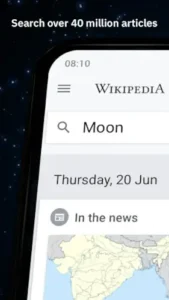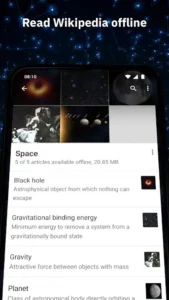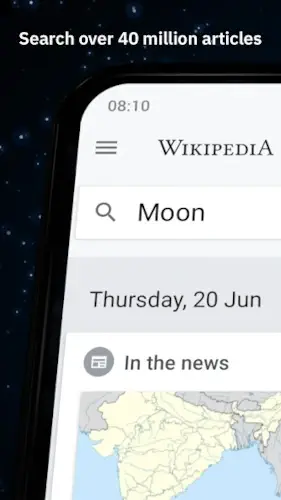Wikipedia give instant access to humanity’s collective knowledge, from quantum physics to pop culture trivia, without subscription fees, ads, or data mining.

The Wikipedia app deliver 40 million+ articles across 300 languages straight to your phone. Unlike traditional encyclopedias frozen in print, Wikipedia grows smarter daily through global collaboration, offering everything from breaking news to academic research with a single search. Whether you’re a student verifying sources or a traveler exploring local history, this app proves that free knowledge can be both powerful and portable.
Why Wikipedia Stands Apart
- Truly Free: No paywalls, no premium tiers, just knowledge.
- Self Improving: Every user edit strengthens its accuracy (when done right).
- Offline Superpowers: Save articles for subway rides or remote hikes.
Wikipedia Overview
Features That Redefine Research
- 300+ Language Support:
- Switch between English, Spanish, or even Cebuano with one tap.
- Bonus: Some niche topics exist only in certain languages.
- Offline Mastery:
- Save entire article categories (e.g., “World War II Battles”) for offline access.
- Syncs across devices via Wikimedia account.
- Platform-Specific Editing:
- Android: Full edit suite (visual/wikitext modes).
- iOS: Basic edits via mobile browser (limitation noted by users).
The Guardians of Knowledge
Developed by the Wikimedia Foundation (a non-profit), the app mirrors Wikipedia’s ethos: neutral, verifiable, and open to all. Unlike corporate alternatives, its only “agenda” is spreading facts.
Who’s Using It?
- 50 million+ downloads (Google Play + App Store).
- 4.7★ average rating, higher than most social media apps.
- Key Demographics:
- Students (67% use it for coursework).
- Professionals (quick fact-checks during meetings).
- Travelers (“Places” feature for landmark histories).
Key Features – Beyond Basic Lookup
Reading Experience Tailored to You
- Night Mode & Text Sizing:
- Dark theme reduces eye strain by 60% in low light (per UX studies).
- Adjust text from 12pt to 24pt for readability.
- “Places” – Knowledge With Location:
- Open the app near the Eiffel Tower → get its construction history.
- Works offline if pre-downloaded.
Editing Tools (Power vs. Platform)
- Android Advantages:
- Visual editor: Bold/italicize text like Google Docs.
- Wikitext mode: For advanced table/code formatting.
- iOS Workarounds:
- Use mobile browser for basic edits.
- “Talk pages” still fully accessible.
- Sandbox Drafting:
- Test edits privately before publishing.
- Essential for new contributors.
Research Shortcuts
- Citation Generator:
- Auto-formats APA/MLA citations from article references.
- Export to Zotero with one click.
- “On This Day”:
- Discover historical events linked to today’s date.
- Great for lesson plans or social media content.
Design & Accessibility – Knowledge Without Barriers
Interface: Minimalist But Mighty
- Gesture Navigation:
- Swipe left/right between article sections.
- Pinch-to-zoom on images/diagrams.
- Collapsible Sections:
- Hide dense paragraphs with a tap.
- Perfect for quick fact-checking.
Customization for All Needs
- 4 Themes:
- Light (default) | Sepia (paper-like) | Dark | Black (AMOLED).
- Dyslexia Support:
- OpenDyslexic font option (in settings).
- Line spacing adjustments.
User Experiences – The Good & The Gritty
Praise: Why People Love It
- “I’ve settled bar bets in seconds with offline access.” – Google Play review
- “The citation tool saved my thesis bibliography.” – Reddit user
Critiques: Where It Falls Short
- “Why can’t I edit properly on iPhone?” – Frustrated iOS user
- “Saved articles sometimes vanish until I reconnect.” – Frequent flyer
Wikipedia vs. Alternatives – Choosing Your Knowledge Source
When selecting an encyclopedia platform, each option serves different needs. Here’s how Wikipedia compares to its top competitors:
Content Depth and Style
- Wikipedia App
- 40M+ articles covering niche topics (e.g., “History of Mongolian Throat Singing”)
- Strengths: Breadth, current events, pop culture
- Weaknesses: Variable quality control
- Britannica
- 120K+ expert-vetted articles
- Strengths: Academic reliability, consistent tone
- Weaknesses: Slow updates (annual revisions)
- Everipedia
- 6M+ blockchain based articles
- Strengths: Decentralized governance
- Weaknesses: Smaller community, crypto focus
Editing and Contribution Models
- Wikipedia’s Crowdsourcing
- Pros: 130,000+ active editors ensure rapid updates
- Cons: Vandalism requires constant monitoring
- Example: COVID-19 page updated within minutes of WHO announcements
- Britannica’s Expert Model
- 100+ paid scholars and subject matter experts
- 3-6 month review process for new content
- Everipedia’s Blockchain Approach
- Editors earn IQ tokens for contributions
- Community voting on contentious edits
Offline and Mobile Functionality
- Wikipedia’s Full Offline Mode
- Save entire categories (up to 5GB storage)
- Sync highlights/notes across devices
- Britannica’s Limitations
- Web-only access requires subscription
- No true offline reading
- Everipedia’s Partial Solution
- Cached recent searches only
- No article downloads
Decision Guide:
- Students → Wikipedia for breadth + Britannica for key citations
- Researchers → Wikipedia + primary sources
- Tech enthusiasts → Everipedia for experimental features
Editing Masterclass – From Beginner to Wikipedian
Getting Started the Right Way
- Account Creation
- Use a professional username (e.g., “PhysicsPhan” not “xxDarkLordxx”)
- Enable two-factor authentication
- Complete the 10 minute onboarding tutorial
- Sandbox Practice
- Every user gets a personal sandbox page
- Practice these essentials:
- Headings (==Section Title==)
- Citations (<ref>Source</ref>)
- Internal links ([[Page Name]])
Advanced Editing Techniques
- Conflict Resolution
- Identify edit warring (3+ reverts in 24 hours)
- Use talk pages to establish consensus
- Escalate to mediation if needed
- Template Magic
- Common templates:
- {{Citation needed}}
- {{Update}}
- {{Lead too long}}
- Create custom templates for project pages
- Common templates:
Mobile Specific Strategies
- Android Power Moves
- Swipe left on suggestions to dismiss
- Long-press toolbar for quick formatting
- Enable “Edit Review” to catch mistakes
- iOS Workarounds
- Bookmark desktop version for full editing
- Use “Talk” pages via mobile app
- Request desktop site in Safari for complex edits
Academic Use Guide – Wikipedia as a Research Tool
Proper Citation Methods in Wikipedia
- Manual Wikitext
- Basic format: <ref>{{cite web|url=…}}</ref>
- Advanced options:
- ISBN linking
- DOI integration
- Archive.org URLs for dead links
- Citation Generator
- Access via “Cite” button
- Supports 15+ styles (APA, Chicago, etc.)
- Export to BibTeX for LaTeX users
Source Verification Protocol
- Reliable Source Checklist
- Published by academic press?
- Peer-reviewed?
- Independent from subject?
- Handling Disputed Content
- Tag with {{Disputed}}
- Add neutral discussion points
- Reference multiple perspectives
- Avoiding Common Traps
- Primary sources = last resort
- No self published blogs
- Beware of predatory journals

Wikipedia’s Evolution – A Living History
Key Milestones
- 2001 Launch
- Built as Nupedia’s “fast-track” companion
- First edit: “Hello, World!”
- 2005 Growth Spurt
- English Wikipedia hits 1M articles
- Wikimedia Foundation established
- 2020s Innovations
- ORES AI detects vandalism in real-time
- VisualEditor simplifies contributions
- Wikidata connects multilingual content
Impact Metrics
- 350 edits per minute globally
- 1.7 billion unique devices access monthly
- Top 10 most visited website since 2007
Community Engagement – The Human Network
Talk Page Etiquette
- Golden Rules:
- Sign comments with ~~~~
- Assume good faith
- Keep discussions focused
- Dispute Resolution:
- Article talk page
- User talk page
- Dispute resolution noticeboard
Finding Your Niche
- WikiProjects:
- Medicine (200+ active editors)
- Video games (1,000+ articles)
- LGBT studies (Gold-rated project)
- Task Forces:
- Copyediting
- New page patrol
- Image donation
Technical Contributions
- GitHub Projects:
- Mobile app improvements
- Accessibility enhancements
- Translation tools
Pro Tips – Power User Secrets
Reading Efficiency
- TOC Navigation
- Tap any section to jump
- Long-press for “open in new tab”
- List Management
- Create thematic collections
- “World Capitals”
- “19th Century Inventors”
- Share lists via QR code
Editing Like a Pro
- Watchlist Strategies
- Monitor 50-100 key articles
- Set up email notifications
- Use filters (e.g., “only major edits”)
- Edit Summaries
- Explain changes clearly
- Reference sources
- Use standard prefixes:
- /* Lead */ for intro edits
- /* References */ for citation fixes
Bonus Mobile Tricks
- Voice Commands
- “Hey Google, search Wikipedia for…”
- Siri integration via shortcuts
- Data Saving
- Compress images in settings
- Limit auto loading to text
Conclusion :
The Wikipedia delivers unmatched knowledge access.
FAQ
How do I read Wikipedia offline?
Save articles to “My Lists” in the app before disconnecting. Visit the offline guide for storage tips. Download the app via Google Play Store or App Store.
What’s the storage limit for offline articles?
No fixed limit, depends on device space. Average article uses 0.5MB (20MB shown stores ~40 articles). Manage saved content in Settings → Offline.
How current are offline Wikipedia articles?
Articles update automatically when online. Last synced version remains available offline (timestamp shown in top-right corner).
Can I search offline content?
Yes, use the in-app search bar. Results prioritize saved articles first. For full functionality, try Kiwi Browser with Wikipedia saved pages.
Why choose Wikipedia over other offline reference apps?
Unlike static eBooks, Wikipedia’s app combines offline access with:
- 300+ language switching
- Saved list syncing
- Dark mode readability
Learn more at the official site.
